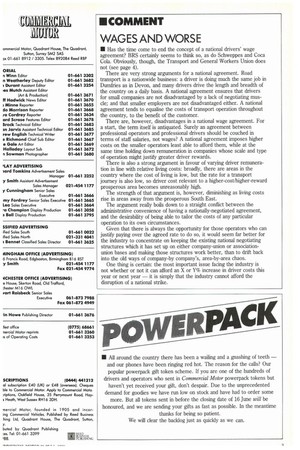IN COMMENT WAGES AND WORSE
Page 3

If you've noticed an error in this article please click here to report it so we can fix it.
• Has the time come to end the concept of a national drivers' wage agreement? ERS certainly seems to think so, as do Schweppes and Coca Cola. Obviously, though, the Transport and General Workers Union does not (see page 4).
There are very strong arguments for a national agreement. Road transport is a nationwide business: a driver is doing much the same job in Dumfries as in Devon, and many drivers drive the length and breadth of the country on a daily basis. A national agreement ensures that drivers for small companies are not disadvantaged by a lack of negotiating muscle; and that smaller employers are not disadvantaged either. A national agreement tends to equalise the costs of transport operation throughout the country, to the benefit of the customer.
There are, however, disadvantages in a national wage agreement. For a start, the term itself is antiquated. Surely an agreement between professional operators and professional drivers should be couched in terms of staff salaries, not wages? A national agreement imposes higher costs on the smaller operators least able to afford them, while at the same time holding down remuneration in companies whose scale and type of operation might justify greater driver rewards.
There is also a strong argument in favour of varying driver remuneration in line with relative living costs: broadly, there are areas in the country where the cost of living is low, but the rate for a transport journey is also low, so driver cost relevant to a higher-cost/higher-reward prosperous area becomes unreasonably high.
The strength of that argument is, however, diminishing as living costs rise in areas away from the prosperous South East.
The argument really boils down to a straight conflict between the administrative convenience of having a nationally-negotiated agreement, and the desirability of being able to tailor the costs of any particular operation to its own circumstances.
Given that there is always the opportunity for those operators who can justify paying over the agreed rate to do so, it would seem far better for the industry to concentrate on keeping the existing national negotiating structures which it has set up on either company-union or associationunion bases and making those structures work better, than to drift back into the old ways of company-by company's, area-by-area chaos.
One thing is certain: the most important issue facing the industry is not whether or not it can afford an X or Y% increase in driver costs this year or next year — it is simply that the industry cannot afford the disruption of a national strike.




























































